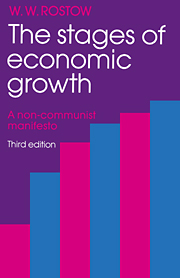Book contents
- Frontmatter
- Contents
- Preface to the Third Edition
- Preface to the Second Edition
- Preface to the First Edition
- 1 INTRODUCTION
- 2 THE FIVE STAGES-OF-GROWTH—A SUMMARY
- 3 THE PRECONDITIONS FOR TAKE-OFF
- 4 THE TAKE-OFF
- 5 THE DRIVE TO MATURITY
- 6 THE AGE OF HIGH MASS-CONSUMPTION
- 7 RUSSIAN AND AMERICAN GROWTH
- 8 RELATIVE STAGES-OF-GROWTH AND AGGRESSION
- 9 THE RELATIVE STAGES-OF-GROWTH AND THE PROBLEM OF PEACE
- 10 MARXISM, COMMUNISM, AND THE STAGES-OF-GROWTH
- Appendix A THE DIFFUSION OF THE PRIVATE AUTOMOBILE
- Appendix B THE CRITICS AND THE EVIDENCE
- Coda: REFLECTIONS ON THE DEBATE AS OF 1990
- Acknowledgments
- Index
9 - THE RELATIVE STAGES-OF-GROWTH AND THE PROBLEM OF PEACE
Published online by Cambridge University Press: 05 June 2012
- Frontmatter
- Contents
- Preface to the Third Edition
- Preface to the Second Edition
- Preface to the First Edition
- 1 INTRODUCTION
- 2 THE FIVE STAGES-OF-GROWTH—A SUMMARY
- 3 THE PRECONDITIONS FOR TAKE-OFF
- 4 THE TAKE-OFF
- 5 THE DRIVE TO MATURITY
- 6 THE AGE OF HIGH MASS-CONSUMPTION
- 7 RUSSIAN AND AMERICAN GROWTH
- 8 RELATIVE STAGES-OF-GROWTH AND AGGRESSION
- 9 THE RELATIVE STAGES-OF-GROWTH AND THE PROBLEM OF PEACE
- 10 MARXISM, COMMUNISM, AND THE STAGES-OF-GROWTH
- Appendix A THE DIFFUSION OF THE PRIVATE AUTOMOBILE
- Appendix B THE CRITICS AND THE EVIDENCE
- Coda: REFLECTIONS ON THE DEBATE AS OF 1990
- Acknowledgments
- Index
Summary
In this chapter we leave the relatively safe world of history to examine the implications for the future of the onward march of compound interest in the various parts of the world when combined with a not wholly unrelated fact; that is, the existence of modern weapons of mass destruction. And having stated, in terms of the stages-of-growth, where it is that the nations stand and appear to be going, we shall suggest briefly and in broad terms how we might go about solving our great common problem—the problem of reasonably stable and secure peace.
THE REVOLUTION IN WEAPONS
First, the weapons and what they have done and are doing to the world arena of power.
There is the story of an American negro community, set in a southern farming area, which was beset with drought. Finally, under the guidance of their pastor, they turned to prayer. For a time they prayed; but the sun continued to shine with a bright cruelty; and the corn stalks were stunted and beginning to wither at the edges; and the cracks multiplied in the dry ground. Then, at last, it rained. At first they wondered at the miracle and were grateful. But as the rain persisted, day and night, beginning to wash away the stunted growths, they grew restive; until the pastor, feeling a special responsibility, resumed the monologue: ‘Lord,’ he said, ‘we suffered from drought; we prayed; and we asked for rain. But what you've given us is plumb ridiculous.’
- Type
- Chapter
- Information
- The Stages of Economic GrowthA Non-Communist Manifesto, pp. 123 - 144Publisher: Cambridge University PressPrint publication year: 1991



